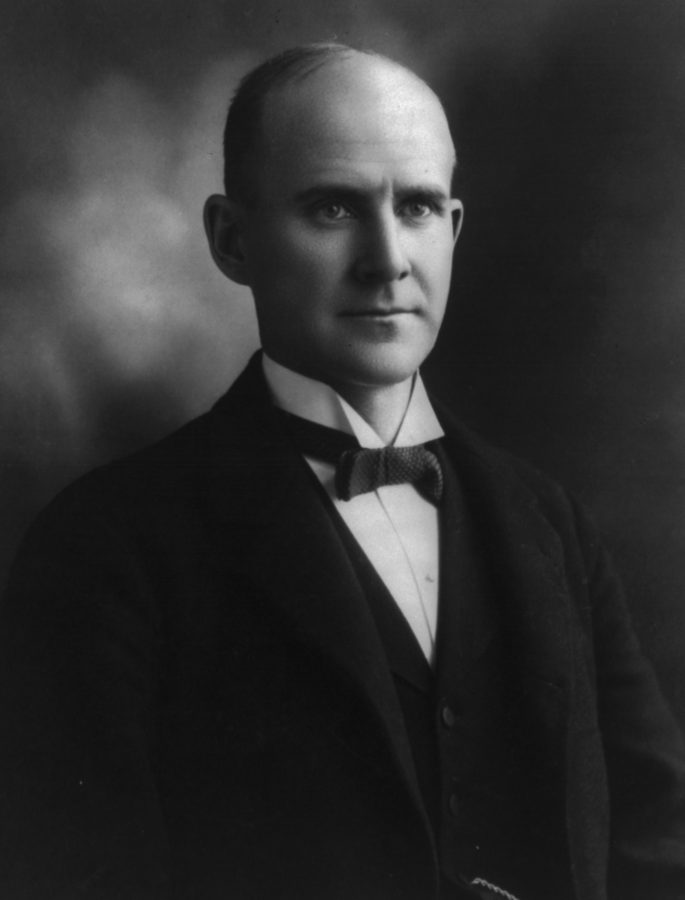Beiwel: Third-party candidates’ ideas are necessary for United States
Eugene Debs received the most amount of votes ever for president by a Democratic Socialist when he ran in 1920.
January 26, 2016
So far, the United States has had 44 presidents, though Grover Cleveland served two terms nonconsecutively and is counted twice. During that time, there have been multiple political parties to pass through the halls of the White House: Democrats, Republicans, Democratic-Republicans, Whigs and one unaffiliated commander in chief.
While the two major parties have dominated the presidency for years, their stranglehold on the election has, at least a few times, been interspersed with candidates of different beliefs who choose to reject the conventional titles. Though, I concede, these were mostly in the formative years of the United States when the parties were establishing themselves and stood for highly different principles, at odds with the ones we hold today.
However, it was not once a given that the president would be a Republican or Democrat. Third parties not only existed but were also viable. This is hardly true today — the last elected candidate from any other party was elected in 1850. While there was a president — Andrew Johnson — from another party who held office during that time, he merely stepped in after Abraham Lincoln was assassinated. The party was, for the most part, just the Republican party under a different name.
This is not to say there have not been third-party candidates throughout the ages. A Democratic Socialist from Indiana named Eugene V. Debs, along with other union leaders and political activists, established the Socialist Party of America in 1904. They bonded together and rallied for higher minimum wage, maximum hours, women’s suffrage, etc.
While Debs ran for president in 1912 and gained 901,200 votes, he was of course not the victor. He was again unable to secure the presidency when he ran in 1920, this time from prison. Debs did, however, secure the largest amount of votes for president ever received by a Democratic Socialist during his second run.
While it can be argued that Debs had no real chance to win, winning was never really his end goal. He simply wanted to call attention to issues that he believed deserved attention from the American people. Because of Debs and the Socialist Party, major child labor was abolished, minimum wage increase and social security have gained more popularity, along with a slew of other improvements.
That is what lies at the heart of why third-party candidates are necessary and beneficial pieces of the American political system. They seek to keep the other candidates honest and open about their practices while providing a dissenting voice to the masses. They allow for more open thought and discussion by rejecting the premise that you either think one way or the other.
An issue does not always only have two sides, and one of the greatest lies of those in power is that there are limited ways to look at things and a limited number of solutions. If you are forced to consider only those two sides of an issue, then you are allowing yourself to look through the tiny lens of an outdated system.
I’m not saying you should completely disregard the main political parties. I’m just saying there are other viewpoints out there, on both the right and the left, that need to be considered. There have been multiple third-party candidates in recent years, including Ron Paul, who secured 0.03 percent of the vote under the Libertarian Party; Ralph Nader, a Green Party candidate in 2000 who won 2.74 percent of the popular vote; and Ross Perot, who garnered 18.6 percent.
Third-party candidates can clearly have their voices heard. Bernie Sanders, a Democratic Socialist running for president in the 2016 election, has gained a large following, particularly by the millennial population, despite his uncommon political label. This could mean that the American people feel more ready to veer away from the traditional system and embrace a new one, where more ideas and pools of thought are considered without bending to the way tradition dictates politics must be done.







